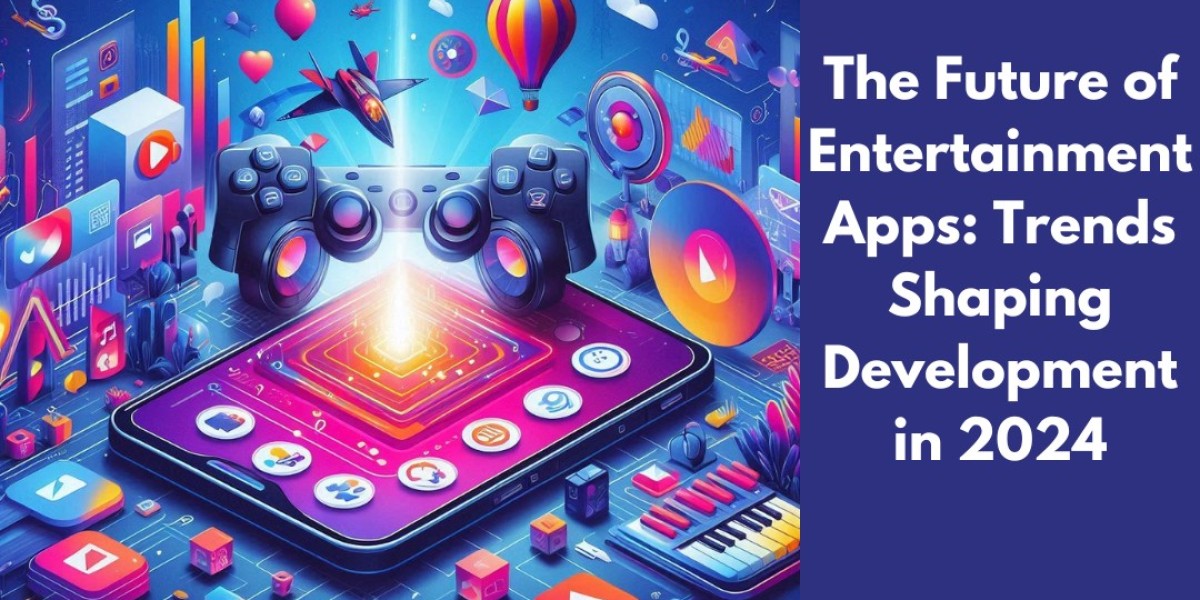The entertainment industry is continually evolving, driven by advancements in technology and changing consumer preferences. As we move into 2024, several trends are shaping the development of entertainment apps, making them more immersive, interactive, and personalized than ever before. In this comprehensive blog, we will explore the key trends influencing the future of entertainment apps and how developers can leverage these trends to create compelling and innovative applications. Additionally, we will address common questions related to these trends in a FAQ section.
1. Immersive Technologies: AR and VR
Augmented Reality (AR)
Augmented Reality (AR) has already made significant inroads in the entertainment sector, and its influence is set to grow even further in 2024. AR enhances the real-world environment by overlaying digital information, offering users an interactive and immersive experience. For entertainment apps, AR can be used in various ways, such as enhancing live events, creating interactive gaming experiences, and providing enriched content for movies and TV shows.
Virtual Reality (VR)
Virtual Reality (VR) offers a completely immersive experience by creating a simulated environment that users can interact with. In 2024, we expect VR to become more mainstream in entertainment apps, particularly in gaming, virtual concerts, and virtual tourism. With advancements in VR hardware and the reduction in costs, more users will have access to high-quality VR experiences, driving the demand for VR-enabled entertainment apps.
2. Artificial Intelligence and Machine Learning
Personalized Content Recommendations
Artificial Intelligence (AI) and Machine Learning (ML) are transforming how entertainment apps deliver content to users. By analyzing user behavior and preferences, AI algorithms can provide personalized content recommendations, ensuring that users are always engaged with content that interests them. This not only enhances the user experience but also increases user retention and engagement.
AI-Driven Content Creation
AI is also playing a role in content creation. In 2024, we will see more AI-generated music, art, and even movies. Entertainment apps can leverage AI to create unique content or assist human creators in generating new ideas, streamlining the content creation process.
3. Social Integration and Community Building
In-App Social Features
Social integration is becoming increasingly important in entertainment apps. Features such as live chats, community forums, and social media sharing options allow users to connect and engage with others, enhancing the overall user experience. In 2024, expect to see more entertainment apps incorporating social features to build vibrant user communities.
User-Generated Content
User-generated content (UGC) is another trend shaping the future of entertainment apps. Platforms that allow users to create and share their content are gaining popularity. Apps like TikTok and YouTube have demonstrated the power of UGC, and more entertainment apps will follow suit, providing tools for users to create and share their own content.
4. Cloud Gaming and Streaming
Cloud Gaming
Cloud gaming is revolutionizing the gaming industry by allowing users to play high-quality games without the need for expensive hardware. In 2024, cloud gaming services will become more prevalent, offering seamless gaming experiences across various devices. Entertainment apps will need to support cloud gaming platforms to stay competitive in this evolving market.
Streaming Services
Streaming services continue to dominate the entertainment landscape, with more users opting for on-demand content. The future of streaming will involve enhanced user experiences, such as 4K streaming, interactive content, and personalized viewing options. Entertainment apps will need to innovate in their streaming capabilities to meet the growing demand for high-quality, flexible content delivery.
5. Blockchain and NFTs
Secure Transactions
Blockchain technology offers secure and transparent transactions, which can be particularly useful for entertainment apps dealing with digital content and in-app purchases. By leveraging blockchain, developers can ensure secure transactions and protect user data, building trust among users.
Non-Fungible Tokens (NFTs)
NFTs are unique digital assets that have gained significant attention in the entertainment industry. In 2024, we will see more entertainment apps integrating NFTs, allowing users to buy, sell, and trade digital collectibles. This can create new revenue streams and enhance user engagement by offering exclusive content and experiences.
6. Enhanced User Experience with 5G
Faster and More Reliable Connections
The rollout of 5G technology is set to transform the user experience for entertainment apps. With faster and more reliable connections, users can enjoy seamless streaming, real-time multiplayer gaming, and instant downloads. This enhanced connectivity will enable developers to create more sophisticated and interactive apps that provide a superior user experience.
Real-Time Interactivity
5G technology will also facilitate real-time interactivity, allowing users to participate in live events, interact with content creators, and engage with other users without latency issues. This will open up new possibilities for live streaming, virtual events, and interactive entertainment experiences.
7. Cross-Platform Development
Seamless User Experience
As users access entertainment content across multiple devices, cross-platform development is becoming increasingly important. In 2024, developers will focus on creating apps that provide a seamless user experience across smartphones, tablets, smart TVs, and gaming consoles. Cross-platform compatibility ensures that users can enjoy their favorite content anytime, anywhere.
Unified Codebase
Using a unified codebase for app development can streamline the development process and reduce costs. Frameworks like React Native and Flutter allow developers to write code once and deploy it across multiple platforms, ensuring consistent performance and user experience.
8. Ethical AI and Data Privacy
Responsible AI Use
As AI becomes more integrated into entertainment apps, ethical considerations around its use are becoming more prominent. Developers must ensure that AI algorithms are transparent, and unbiased, and respect user privacy. In 2024, expect to see more entertainment apps adopting responsible AI practices to build user trust.
Data Privacy Regulations
With increasing concerns about data privacy, entertainment app developers must comply with data protection regulations, such as GDPR and CCPA. Ensuring that user data is securely stored and processed is crucial for maintaining user trust and avoiding legal issues.
FAQ: The Future of Entertainment Apps: Trends Shaping Development in 2024
Q1: What are the key trends shaping the development of entertainment apps in 2024?
The key trends include the integration of immersive technologies like AR and VR, the use of AI and ML for personalized content recommendations and AI-driven content creation, social integration and community building, the rise of cloud gaming and streaming services, the adoption of blockchain and NFTs, enhanced user experiences with 5G, cross-platform development, and a focus on ethical AI and data privacy.
Q2: How will AR and VR impact entertainment apps in 2024?
AR and VR will make entertainment apps more immersive and interactive. AR can enhance live events and create interactive experiences, while VR offers fully immersive environments for gaming, virtual concerts, and virtual tourism. These technologies will provide users with unique and engaging experiences.
Q3: What role will AI and ML play in the future of entertainment apps?
AI and ML will be crucial for personalizing content recommendations, ensuring users are engaged with content that interests them. They will also aid in AI-driven content creation, helping generate music, art, and even movies. These technologies will enhance user experiences and streamline content creation processes.
Q4: Why is social integration important for entertainment apps?
Social integration enhances user engagement by allowing users to connect, share, and interact with others. In-app social features and user-generated content build vibrant communities and keep users engaged. This social aspect is essential for retaining users and driving app growth.
Q5: How will 5G technology influence entertainment apps?
5G technology will provide faster and more reliable connections, enabling seamless streaming, real-time multiplayer gaming, and instant downloads. This enhanced connectivity will allow for more sophisticated and interactive apps, offering superior user experiences and real-time interactivity.
Q6: What is the significance of blockchain and NFTs in entertainment apps?
Blockchain offers secure and transparent transactions, enhancing trust and security in digital content and in-app purchases. NFTs allow users to buy, sell, and trade unique digital assets, creating new revenue streams and exclusive content opportunities. These technologies will revolutionize digital ownership and monetization.
Q7: Why is cross-platform development important for entertainment apps?
Cross-platform development ensures a seamless user experience across multiple devices, such as smartphones, tablets, smart TVs, and gaming consoles. Using a unified codebase for app development streamlines the process, reduces costs, and ensures consistent performance and user experience across all platforms.
Q8: How can developers ensure ethical AI and data privacy in entertainment apps?
Developers must adopt responsible AI practices, ensuring algorithms are transparent and unbiased, and respect user privacy. Complying with data protection regulations, such as GDPR and CCPA, is crucial. Securely storing and processing user data is essential for maintaining user trust and avoiding legal issues.
Conclusion
The entertainment app development company is bright, with numerous trends shaping its development in 2024. From immersive technologies like AR and VR to AI-driven personalization, social integration, cloud gaming, blockchain, and 5G, the possibilities are vast and exciting. As developers embrace these trends, they will create more engaging, interactive, and personalized experiences for users.
However, it's essential to balance innovation with ethical considerations and data privacy. By adopting responsible AI practices and complying with data protection regulations, developers can build trust and provide secure, high-quality entertainment experiences.
As we look ahead, the entertainment industry will continue to evolve, driven by technological advancements and changing consumer preferences. By staying abreast of these trends and leveraging them effectively, developers can ensure their entertainment apps remain at the forefront of this dynamic and ever-changing landscape.








